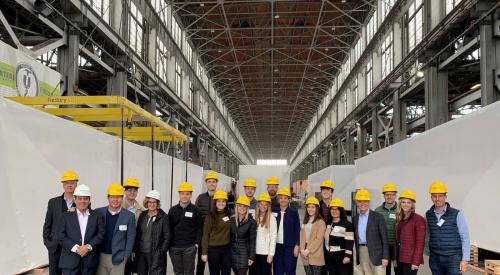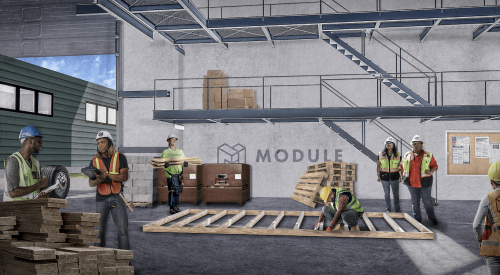
Co-founder, FwdSlash
As a primary care doctor, Sameer Sood’s line of work could easily be perceived as entirely unrelated to housing. But without first![]() addressing the social determinants of human health, such as transportation, housing, and education, Sood says his job as a physician is rendered largely useless. His frustration with the lack of a broader, more holistic approach to health care inspired him to co-found FwdSlash, which won in the ESG (environmental, social, and governance) category at the 2023 Housing Innovation Summit’s Pitchfest event for its approach to addressing health and homelessness as intertwined objectives.
addressing the social determinants of human health, such as transportation, housing, and education, Sood says his job as a physician is rendered largely useless. His frustration with the lack of a broader, more holistic approach to health care inspired him to co-found FwdSlash, which won in the ESG (environmental, social, and governance) category at the 2023 Housing Innovation Summit’s Pitchfest event for its approach to addressing health and homelessness as intertwined objectives.
Funded by prospective customers and a mixture of grants, FwdSlash is creating a three-way marketplace of health care, community-based organizations, and housing industry stakeholders to make affordable shelter a value-based investment.
PRO BUILDER: What inspired FwdSlash?
Sameer Sood: My background is in the health-care industry and I am still in practice as a primary care provider. At FwdSlash, we’re working to have things like housing, food, transportation, and job training become part of the health-care spectrum.
Housing is a huge part of what makes up someone’s health, so those who impact housing, like real estate developers and landlords, are not as indirectly involved in the health-care ecosystem as it may seem.
For instance, landlords who don’t accept housing vouchers in a vulnerable, low-income community may inadvertently be pushing would-be tenants into temporary emergency housing situations that can negatively impact health. We’re looking for ways to engage those atypical actors to prevent that scenario from happening.
RELATED
- NAHB's Lake Coulson Weighs in on the Latest Housing Policy Initiatives
- Soil Connect Is Moving Dirt and Building Relationships
- John Green’s Plan to Eliminate Predatory Lending Practices
PB: Why has it been difficult for Housing First community-based organizations to contract with Medicaid organizations (MCOs)?
SS: Medicaid organizations typically only cover clinical appointments for unemployed patients. Aspects of behavioral health and social determinants of health, including housing, aren’t covered because no government subsidy exists for that kind of health coverage.
Instead, those types of services typically come from nonprofits that rely on grants and foundation money to do their brilliant work, but which struggle to survive every day. It can be really difficult for those organizations to show their value to Medicaid or the health-care systems we currently have in place. How do you demonstrate that the housing services you’ve provided have kept someone out of the emergency room 100 times this year, which is saving that health insurance company $20,000 or more?
These types of contracts are hard for physicians to make, nevermind volunteer or very low paid-for nonprofits.
PB: What are some of the organizations you’re working with and what’s your process for securing investments from MCOs?
SS: We work with the West Virginia Coalition to End Homelessness and the Welcome House, in Northern Kentucky, among others, all of which are currently funded by grant money. They have amazing case managers, some of whom have experienced homelessness personally and have the capacity to really change lives, but they’re not being funded enough to provide the level of service we’re advocating.
We’re finding so much value generation in the braiding together of two massive industries. Monetarily, for sure, but really in terms of impacting lives, reducing health-care costs, and changing the faces of communities that are plagued by homelessness.
As a value proposition to health insurance companies, we’re demonstrating that the high cost of coverage for housing-insecure or homeless individuals on Medicaid can be reduced by about 40% or 50% in the first year and every year thereafter with the help provided by these community organizations. We want to see those cost savings secure up-front payments for services.
PB: Are you moving unhoused Americans into existing housing or working to build new units?
SS: Part of our work is to first help community nonprofits demonstrate their value for Medicaid contracts that ultimately help at-risk populations secure existing housing. But we also secure master leases in situations where landlords are unwilling to accept housing vouchers. We then provide compelling terms for leases that many landlords are open to.
In communities where there aren’t landlords or there aren’t many opportunities to acquire or develop housing, we do that, too. In Sacramento, [Calif.,] we are working with a community organization who is allowing their land to be developed into affordable housing units. We won the contract to develop a housing solution that generates tenant-based revenue while simultaneously creating cost-of-care savings returns.
We’re finding so much value generation in the braiding together of two massive industries. Monetarily, for sure, but really in terms of impacting lives, reducing health-care costs, and changing the faces of communities that are plagued by homelessness. That’s really what we're pushing for.













